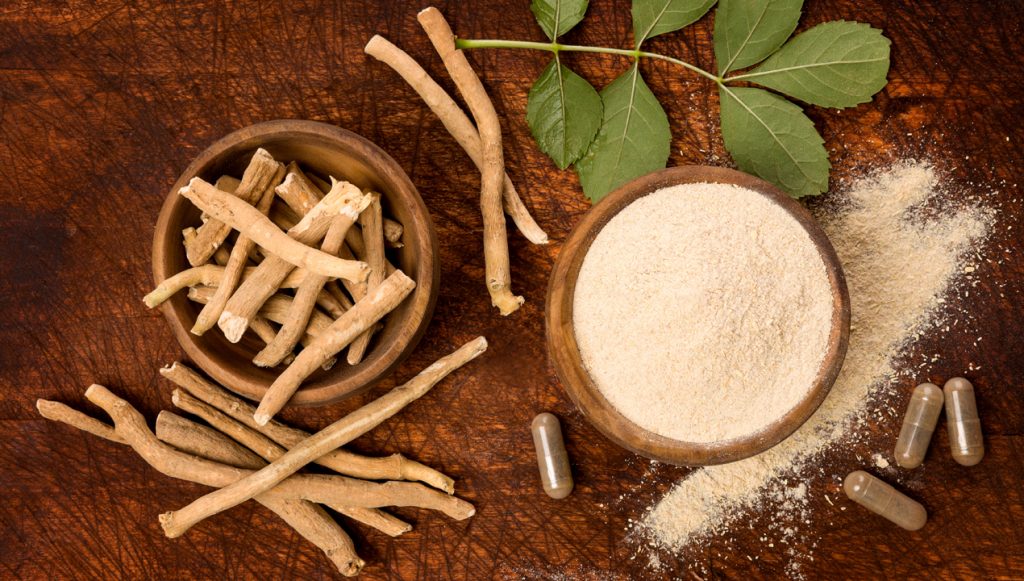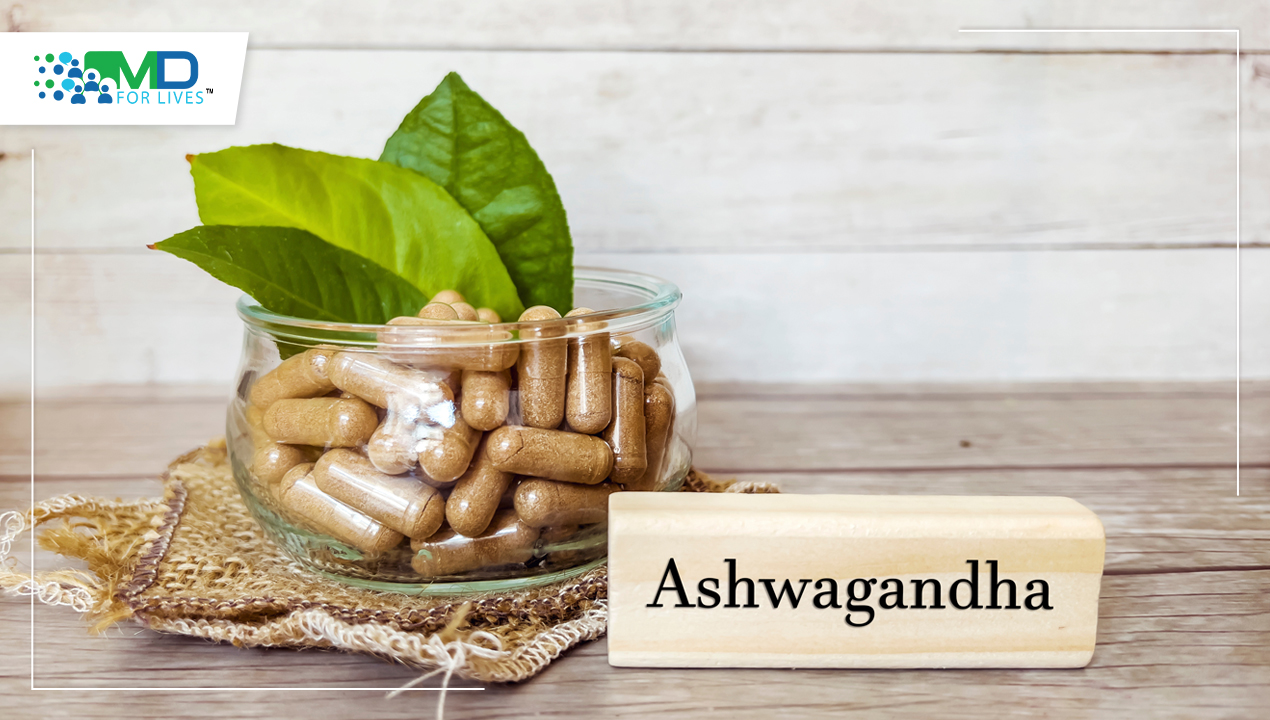Ashwagandha (Withania somnifera) is a type of Rasayana used in Ayurvedic medicine. It is a powerful regenerative tonic with many pharmacological properties, including anti-stress, anti-inflammatory, anti-arthritic, analgesic and neuroprotective effects. It also has potential anti-tumor properties. This plant is a compact shrub that belongs to the Solanaceae family. It grows extensively in arid regions of South Asia, Central Asia and Africa.

Research studies conducted in different health conditions indicate that using Ashwagandha root extracts can improve sexual performance in males and females, reduce and manage stress and anxiety and enhance memory and cognition in both healthy individuals and those diagnosed with bipolar disorder.
Stress is a broad term that refers to the body’s non-specific reaction to any demand for change. It is a significant factor that worsens hypertension and diabetes, which are the leading causes of death globally. Additionally, high levels of stress can trigger mood disorders, including anxiety and depression.
Two double-blind studies, which used a placebo-controlled approach, found that ashwagandha was linked to more significant decreases in anxiety among adults with predominantly generalized anxiety disorder.
In an 8-week clinical trial that used a randomized, double-blind, placebo-controlled approach, it was found that ashwagandha was linked to significant reductions in anxiety, morning cortisol, c-reactive protein, pulse rate and blood pressure among adults who experience chronic stress.
Additional randomized, double-blind, placebo-controlled studies have validated the anti-stress and cortisol-reducing effects of ashwagandha among adults who self-report chronic stress and those who are overweight or obese and experience chronic stress. These studies also found that ashwagandha was generally well-tolerated, with few reported adverse effects.
Stress-relieving and pharmacological actions of an ashwagandha extract: A 60-day randomized trial
A randomized, double-blind, placebo-controlled trial found that taking an ashwagandha extract called Shoden for 60 days resulted in significant emotional improvements in mildly anxious, healthy adults over time. Using the Hamilton Anxiety Rating Scale (HAM-A), it was found that anxiety levels decreased by 41% in participants taking ashwagandha, which was better than the 24% reduction seen in those taking a placebo. To understand the therapeutic mechanisms of ashwagandha in stressed adults, the study measured changes in cortisol and steroidal hormones, DHEA-S and testosterone. It was discovered that ashwagandha intake was linked to a reduction in morning cortisol (23% reduction and 0.5% increase, respectively) and DHEA-S (8.2% decrease and 2.5% increase, respectively), compared to placebo. Taking ashwagandha was also associated with a significant 10.6% increase in testosterone, which was higher than the 0.1% increase observed in the placebo group, but the differences between the two groups in testosterone levels did not reach statistical significance.
Efficacy and Safety of an Ashwagandha Root Extract in Insomnia and Anxiety: A 10-week randomized trial
Insomnia, a sleep disorder that is affecting a large global population and impairing general health and mental well-being, is caused by various factors including stress, anxiety, asthma, hormonal imbalances, lifestyle modifications and other disease conditions such as cancer. A randomized, double-blind, controlled clinical trial was conducted to assess the effects of Ashwagandha root extracts on different components of sleep quality and anxiety levels in insomnia patients over a 10-week treatment period. The results showed a significant improvement in sleep quality, reduced sleep onset latency and lower anxiety levels in the participants who received Ashwagandha root extract compared to those who received a placebo. The differences between the two groups were found to be statistically significant. The study found that Ashwagandha root extracts are well-tolerated and can improve sleep parameters in patients with insomnia and anxiety at a dose of 300 mg extract twice daily.
Conclusion:
In conclusion, ashwagandha has shown promise in treating a variety of health conditions, including anxiety, stress, insomnia and cognitive function. Multiple randomized, double-blind, placebo-controlled trials have demonstrated the efficacy and safety of ashwagandha in improving these health outcomes, with minimal reported adverse effects. While more research is needed to fully understand the therapeutic mechanisms of ashwagandha, these studies suggest that it could be a useful natural supplement for those looking to improve their mental and physical well-being.
References:
1. Gupta S, Bansal R, Sodhi S, Brar G, Malhotra M. Ashwagandha (Withania somnifera) – a herb with versatile medicinal properties empowering human physical and mental health. Journal of Pre-Clinical and Clinical Research. 2021;15(3):129-133. doi:https://doi.org/10.26444/jpccr/141582
2. Lopresti AL, Smith SJ, Malvi H, Kodgule R. An investigation into the stress-relieving and pharmacological actions of an ashwagandha (Withania somnifera) extract: A randomized, double-blind, placebo-controlled study. Medicine. 2019;98(37):e17186. doi:https://doi.org/10.1097/MD.0000000000017186
3. Langade D, Kanchi S, Salve J, Debnath K, Ambegaokar D. Efficacy and Safety of Ashwagandha (Withania somnifera) Root Extract in Insomnia and Anxiety: A Double-blind, Randomized, Placebo-controlled Study. Cureus. 2019;11(9). doi:https://doi.org/10.7759/cureus.5797

MDForLives is a global healthcare intelligence platform where real-world perspectives are transformed into validated insights. We bring together diverse healthcare experiences to discover, share, and shape the future of healthcare through data-backed understanding.






